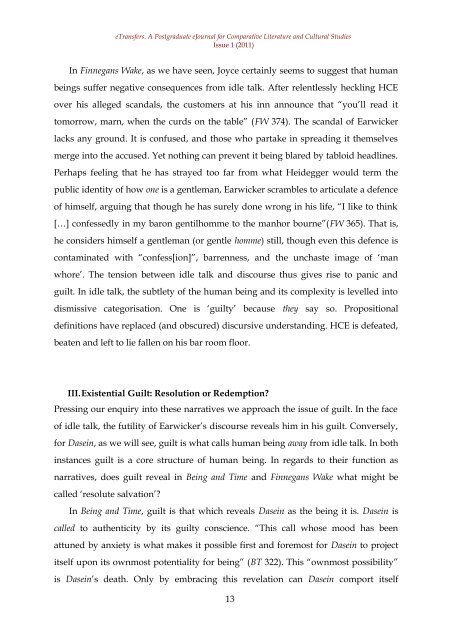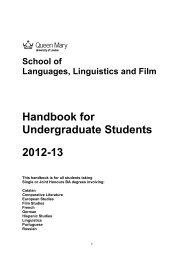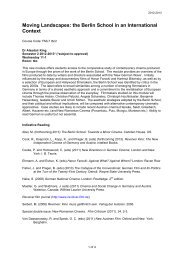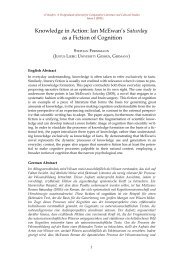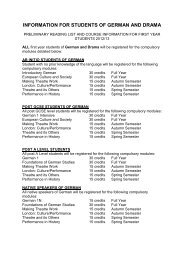Finnegans Wake - Queen Mary, University of London
Finnegans Wake - Queen Mary, University of London
Finnegans Wake - Queen Mary, University of London
Create successful ePaper yourself
Turn your PDF publications into a flip-book with our unique Google optimized e-Paper software.
eTransfers. A Postgraduate eJournal for Comparative Literature and Cultural Studies<br />
Issue 1 (2011)<br />
In <strong>Finnegans</strong> <strong>Wake</strong>, as we have seen, Joyce certainly seems to suggest that human<br />
beings suffer negative consequences from idle talk. After relentlessly heckling HCE<br />
over his alleged scandals, the customers at his inn announce that “you’ll read it<br />
tomorrow, marn, when the curds on the table” (FW 374). The scandal <strong>of</strong> Earwicker<br />
lacks any ground. It is confused, and those who partake in spreading it themselves<br />
merge into the accused. Yet nothing can prevent it being blared by tabloid headlines.<br />
Perhaps feeling that he has strayed too far from what Heidegger would term the<br />
public identity <strong>of</strong> how one is a gentleman, Earwicker scrambles to articulate a defence<br />
<strong>of</strong> himself, arguing that though he has surely done wrong in his life, “I like to think<br />
[…] confessedly in my baron gentilhomme to the manhor bourne”(FW 365). That is,<br />
he considers himself a gentleman (or gentle homme) still, though even this defence is<br />
contaminated with “confess[ion]”, barrenness, and the unchaste image <strong>of</strong> ‘man<br />
whore’. The tension between idle talk and discourse thus gives rise to panic and<br />
guilt. In idle talk, the subtlety <strong>of</strong> the human being and its complexity is levelled into<br />
dismissive categorisation. One is ‘guilty’ because they say so. Propositional<br />
definitions have replaced (and obscured) discursive understanding. HCE is defeated,<br />
beaten and left to lie fallen on his bar room floor.<br />
III.Existential Guilt: Resolution or Redemption?<br />
Pressing our enquiry into these narratives we approach the issue <strong>of</strong> guilt. In the face<br />
<strong>of</strong> idle talk, the futility <strong>of</strong> Earwicker’s discourse reveals him in his guilt. Conversely,<br />
for Dasein, as we will see, guilt is what calls human being away from idle talk. In both<br />
instances guilt is a core structure <strong>of</strong> human being. In regards to their function as<br />
narratives, does guilt reveal in Being and Time and <strong>Finnegans</strong> <strong>Wake</strong> what might be<br />
called ‘resolute salvation’?<br />
In Being and Time, guilt is that which reveals Dasein as the being it is. Dasein is<br />
called to authenticity by its guilty conscience. “This call whose mood has been<br />
attuned by anxiety is what makes it possible first and foremost for Dasein to project<br />
itself upon its ownmost potentiality for being” (BT 322). This “ownmost possibility”<br />
is Dasein’s death. Only by embracing this revelation can Dasein comport itself<br />
13


